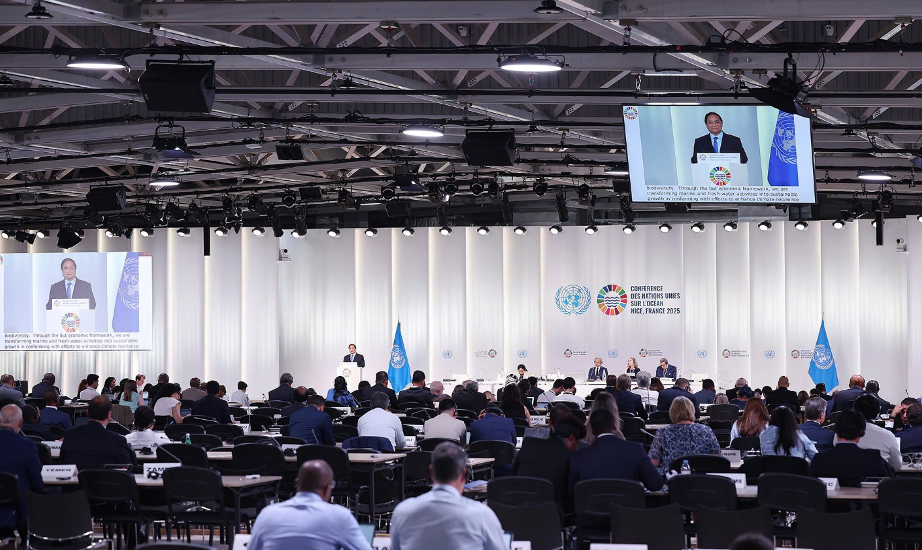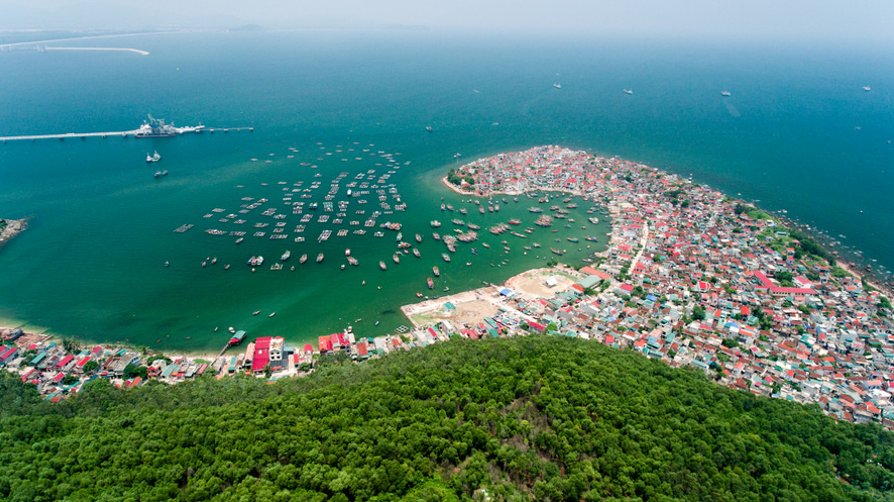Within France's third United Nations Ocean Conference (UNOC-3) framework, Vietnam was among the first countries to approve the Agreement on the Conservation and Sustainable Use of Marine Biological Diversity of Areas Beyond National Jurisdiction (also known as the High Seas Treaty). At UNOC-3, Prime Minister Pham Minh Chinh announced that Vietnam had registered 15 voluntary ocean and marine governance commitments.
One of the first countries to sign the High Seas Treaty
According to the Ministry of Foreign Affairs, Deputy Prime Minister and Minister of Foreign Affairs Bui Thanh Son handed over the instrument of approval to Ms. Elinor Jane Britt Hammarskjöld, UN Assistant Secretary-General and Legal Counsel, announcing the Vietnamese Government's ratification of the High Seas Treaty.
Vietnam was one of the first countries to sign the treaty on the very first day and is among the leading nations to complete internal procedures to become a party to the Agreement. This sends a strong message that Vietnam is an active and responsible member of the international community, joining hands with countries worldwide to address global issues related to the seas and oceans.
 Prime Minister Pham Minh Chinh speaks at the Third United Nations Ocean Conference's Finance and Blue Economy Forum (UNOC 3). (Photo: VGP)
Prime Minister Pham Minh Chinh speaks at the Third United Nations Ocean Conference's Finance and Blue Economy Forum (UNOC 3). (Photo: VGP)Prime Minister Pham Minh Chinh and the high-level Vietnamese delegation's participation in significant activities related to the High Seas Treaty demonstrates the Vietnamese Government's determination and concrete actions in the global effort to build a peaceful, prosperous, and sustainably developed ocean.
The High Seas Treaty is a historic milestone in the international community's efforts to protect the marine environment within the context of implementing the 2030 Agenda, especially Sustainable Development Goal 14 on the conservation and sustainable use of oceans, seas, and marine resources. This is the third AgreementAgreement negotiated and signed under the framework of the 1982 United Nations Convention on the Law of the Sea. The treaty will take effect 120 days after 60 countries have deposited their instruments of ratification or approval.
15 voluntary commitments on ocean and marine governance
On June 9, at the UNOC-3 plenary session, Prime Minister Pham Minh Chinh delivered a keynote address representing the 10 ASEAN countries and shared Vietnam's perspectives on the conservation and sustainable use of oceans, seas, and marine resources.
In his remarks, Prime Minister Chinh shared four priority orientations of ASEAN countries, including safeguarding the seas and oceans as spaces of peace, cooperation, development, and shared responsibility; promoting the integration of a consistent global approach and regional efforts in ocean and marine governance; recognizing seas and oceans as a core driver of prosperous development; and calling for accelerated global ocean governance based on cooperation instead of competition to expedite the implementation of SDG 14.
Prime Minister Chinh also emphasized the need to focus resources on three areas. First, investment in research, development, and application of marine science should be increased, including technology transfer, research cooperation, experience sharing, and building a global ocean data system.
Second, boosting mobilization and efficient use of resources for sustainable blue economic development, with the spirit of "The State leads – Enterprises pioneer – People accompany – International organizations facilitate and support," creating a blue ocean finance ecosystem in which Vietnam is ready to pioneer a pilot model.
Third, intercontinental, interregional, and international connectivity and global blue ocean governance should be strengthened under the "UN-centered – International law-based – International cooperation-led" principle to form "blue growth hubs" that link global marine economic centers. Vietnam is ready to actively participate in and contribute to developing this network in the East Sea (South China Sea), a strategic maritime area worldwide.
Previously, Vietnam was listed among the world's top ocean plastic polluters. In response and to demonstrate its responsibility to humanity, Vietnam has launched initiatives to raise public awareness and encourage businesses to reduce their dependence on single-use plastics. In addition, Vietnam has implemented a strong legal framework to address marine protection, with specific strategies such as the National Environmental Protection Strategy for 2030 emphasizing pollution control and marine ecosystem conservation.
 Vietnam strongly commits to protecting the sea and oceans.
Vietnam strongly commits to protecting the sea and oceans.Six strategic directions proposed
In his speech at the conference, the Prime Minister called on the international community to act faster, stronger, and more decisively and for nations, regions, and the world to join hands in the conservation and sustainable use of the blue ocean. To achieve this, the Prime Minister emphasized a scientific, evidence-based, people-centered, holistic, and global approach based on fairness, equality, inclusiveness, cooperative development, and harmonized interests through concrete mechanisms, policies, solutions, and actions.
The Prime Minister proposed six core directions: emphasize scientific foundations combined with traditional knowledge in policymaking; promote science, technology, innovation, and digital transformation to drive sustainable marine economic development; unlock, mobilize, and efficiently use resources for blue economy development; adopt a comprehensive, multi-sector approach in ocean governance and development; enhance interregional, international, and intercontinental connectivity to form regional and global networks of blue economic centers; and uphold solidarity and international cooperation in the sustainable development and conservation of oceans and seas.
Vietnam has been and continues to work comprehensively, vigorously, and at multiple levels with partners to realize the goal of conserving and sustainably using the marine environment (SDG 14) under the spirit of the "3 Proactive": proactively implementing policies and programs to develop blue economic sectors and restore marine ecosystems; proactively promoting partnerships and cooperation with countries, international organizations, and stakeholders, especially in knowledge sharing and technology transfer; and proactively proposing and actively participating in initiatives at national, regional, and global levels.